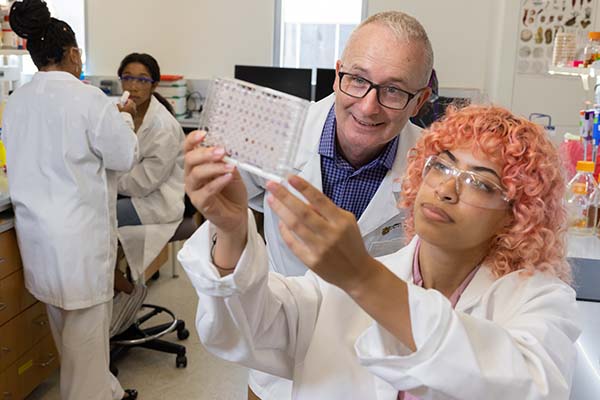Inspire Summer Scholars Program
The College of Science and Mathematics (CSM) undergraduate students are invited to apply for the 2026 Inspire Summer Scholars Program.

Program Description
The goal of this summer program is to provide experiential learning to undergraduate science and mathematics majors. Students will develop skills to enhance their interest in undergraduate research, service learning, and internships.
Each student accepted to the program will be hired as a student assistant and paid at the rate of $12.75 per hour. Although each week may vary, students may work up to 20 hours per week. In addition to meeting the expectations of the research project, students will be expected to complete lab training during the first week of the program, as well as submit a report and digital poster at the end of the program.
Students are also encouraged to participate in the Fall KSU Symposium of Student Scholars as an attendee or presenter.
Timeframe
Monday, May 18 – Friday, July 31, 2026
Student Eligibility
This program is open to any undergraduate student with a major in the CSM. There are no course prerequisites. Students will be selected based on a match of their interests with the projects available. Students will be able to view available projects and apply for one program. Preference will be given to students in their first or second year of study without prior experience. Application deadline is March 27, 2026.
Current Projects
Research projects for 2026 coming soon!
Faculty Information
All full-time CSM faculty are eligible to participate and will receive summer pay for leading/co-leading projects. Each faculty member is expected to mentor a team of at least 4 students. Faculty mentors will receive 10% in summer salary for mentoring 4 or more students. Funds for materials and supplies related to the work will be provided with discipline-specific considerations. Individuals or teams of faculty may apply. Faculty will be required to be present 80% of the 11 weeks (May 18, 2026 - July 31, 2026) and the maximum amount of funding for each project will be limited to $20,000.
For eligibility and how to apply, please see tabs below more information:
Faculty interested in participating in this program must submit a plan (3-page limit) for an undergraduate research, service learning, or internship experience that addresses the following criteria:
- Description of the overarching theme of the project,
- Knowledge and skills that students will acquire in practice, and after critical reflection.
- Budget with justification (please provide budget request with short narrative for related costs, estimated student pay and 10% faculty summer salary).
- How the project meets QEP Characteristics of an Engaged Learning Undergraduate Research Experience.
- How student learning will be assessed.
The faculty application deadline is Wednesday, December 3, 2025.
For questions, please contact csminspire@kennesaw.edu
Application Review: Projects will be reviewed, and recommended for funding by the Research Advisory Committee. Other reviewers may be consulted on an ad hoc basis where their expertise might be helpful in proposal evaluation. Project funding is dependent on availability of funds, and funding may be less than the amount requested.







